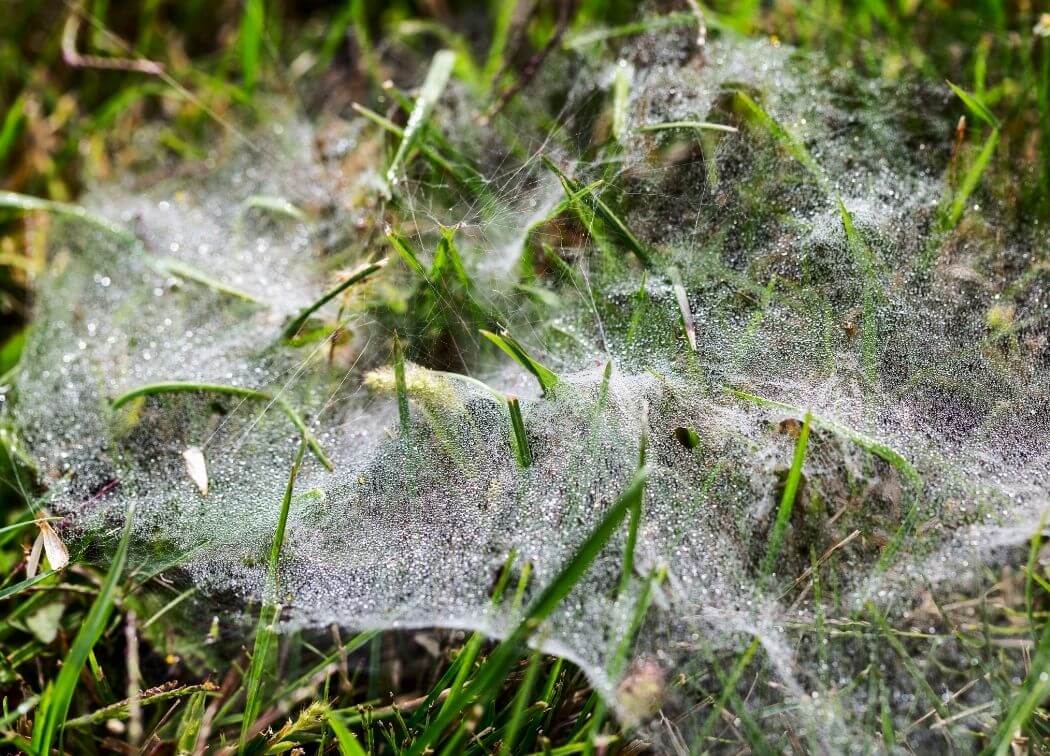You might not see it at first glance, but your lawn is a breeding ground for all sorts of nasty bugs and small insects. And yes, that includes spiders!
Lawn spiders crawling around and spinning webs can be a real nuisance to deal with. Even though they are mostly harmless, you must always watch for the dangerous ones.
In this guide, we will discuss the most common species of lawn spiders and how to get rid of them. These spiders include:
- Grass Spiders
- Wolf Spiders
- Hobo Spiders
The easiest way to get rid of lawn spiders is to trim the dense vegetation and keep the grass short, which provides less cover for the spiders. Remember to manually clean out the spider webs and never leave pet food particles that could attract insects that spiders eat.
Lawn Spiders Identification
There are many different species of spiders, but the most common ones found on your lawn are the grass spider, wolf spider, and hobo spider.
The first step to getting rid of spiders is to identify them.
1. Grass Spiders
A grass spider (Agelenopsis spp) is probably the most common type of lawn spider.
It is a funnel-web spider that uses grass blades to spin funnel webs, which look like little holes or caves.
These spiders spin webs in the grass or low in the ground.
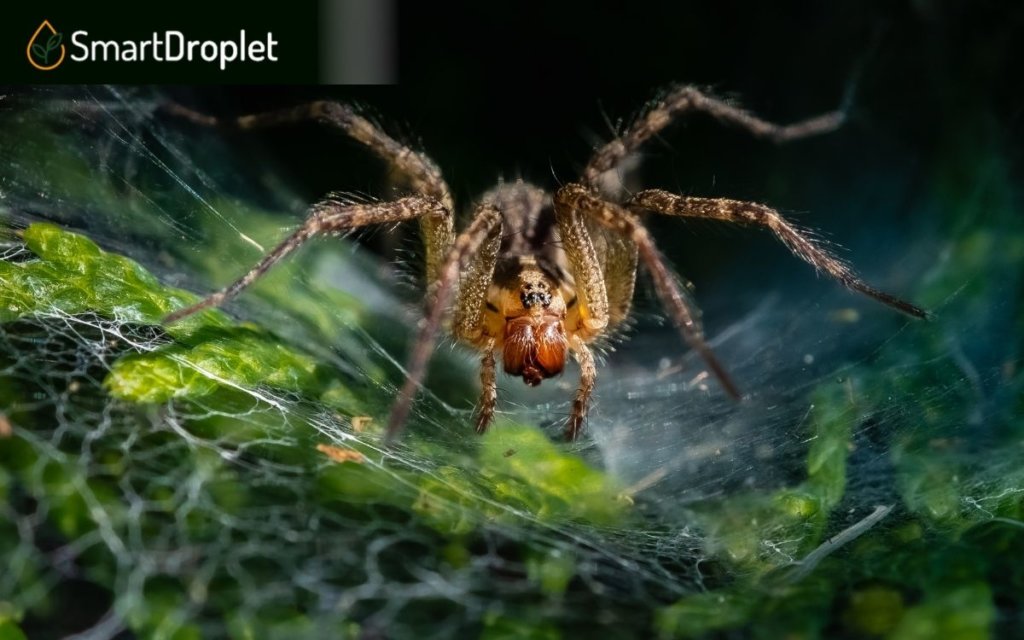
Grass spider webs are not sticky, but this spider web can easily cause prey to get tangled in them.
These spiders help control insects but are harder to get rid of once they overpopulate.
You will mostly find grass spiders inside your warm house to escape the cold air during winter since they do not like colder climates.
No need to fear grass spiders since they are NOT DANGEROUS to humans. Why? Because the species is not good against harsh weather conditions, especially the harsh winter season!
You can identify a grass spider through its brownish-yellow color, prominent hind spinnerets, two black stripes on the abdomen, and dark bands on the cephalothorax.
They can grow up to 19mm in body length.
2. Wolf Spiders
Wolf spiders are often mistaken for grass spiders for their stripe patterns, but wolf spiders do not spin spider webs.
Instead of small webs, they dig small holes in the lawn where they wait for prey to fall.
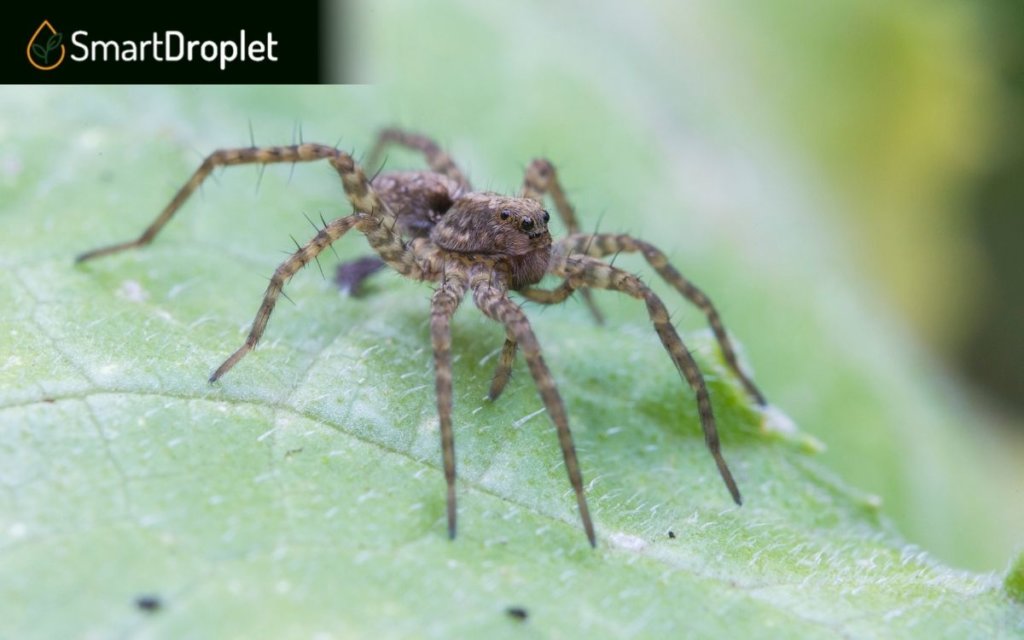
Because of their impressive speed, wolf spiders do not need webs to entangle their prey as a grass spider does.
It uses its long legs and sharp eyesight to catch other insects.
You will find these types of spiders in lawns with a lot of insect activity and other unwanted insects, making it a good place for hunting.
3. Hobo Spiders
Hobo spiders spin funnel-shaped webs, just like grass spiders. Their webs are in smaller patches and spread across the lawn.
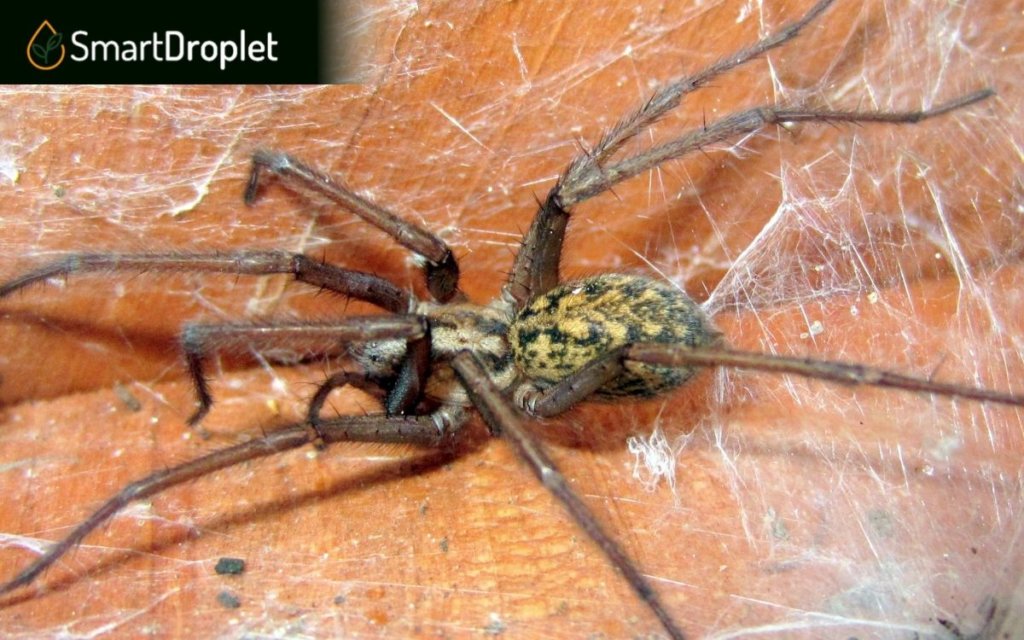
They share many similar physical characteristics as most species, making them hard to identify.
- These characteristics include their brown body, yellow spots, grayish abdomen, and large spinnerets.
- You might mistake a hobo spider for a wolf spider or brown recluse spider.
Are Grass Spiders Poisonous?
An American grass spider is not a deadly creature to the point that one bite will kill you. If anything, grass spiders release toxins to attack their prey.
- Do not worry, though; the venom of a grass spider is not fatal to humans.
Wolf spiders are similar in the sense that they are not life-threatening spiders. They will leave you with a painful bite but nothing too dangerous.
The ones you should worry about are hobo spiders, as they produce a fairly dangerous venom. You do now want to provoke these spiders!
Remember, always be careful and be wary of spider bites when spending a lot of time outdoors on your lawn.
Clean and maintain your lawn frequently to prevent spider bites or any bite from any insect!
Seek medical attention IMMEDIATELY if you think a venomous spider has bitten you.
Do Lawn Spiders Bite?
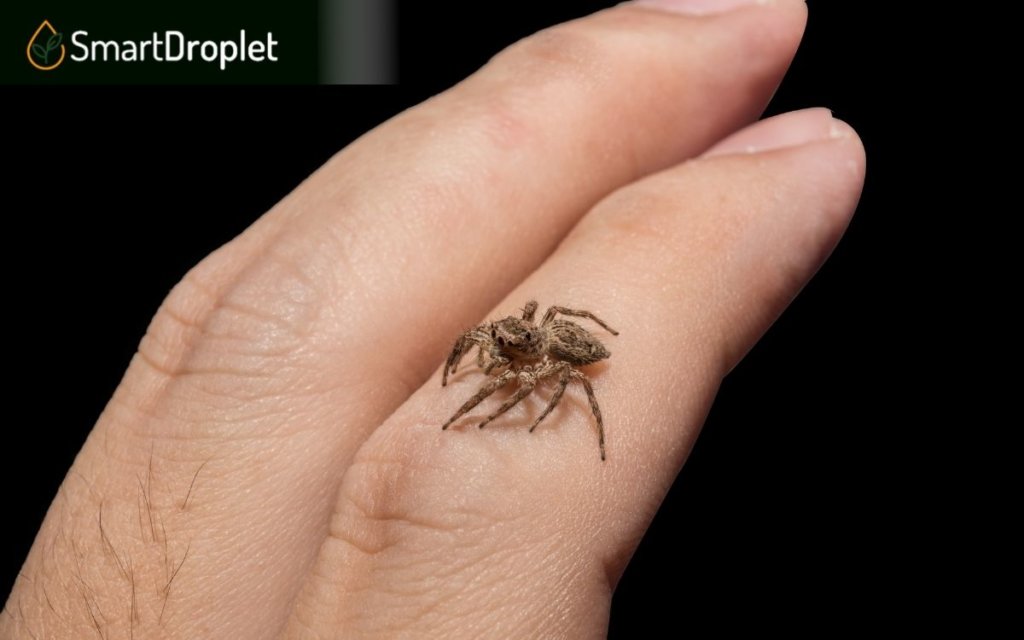
Many species bite and don’t bite. For now, we will refer to the three species that were referred to previously.
A grass spider bite also acts as a defense mechanism if they feel threatened by humans or larger animals.
- While a bite from a grass spider is not fatal, if penetrated through human skin (any thin skin for that matter), it can cause necrotic skin lesions or bacterial infections.
Meanwhile, wolf spiders will bite, especially if provoked, and it will be a painful one. Otherwise, they will leave you alone.
- These spiders are venomous, but the venom is harmless and requires little treatment.
Like wolf spiders, hobo spiders will not attack people but release venom if provoked.
How to Get Rid of Grass Spiders in Your Lawn
Generally, grass spiders are harmless and, in fact, beneficial to a well-kept yard.
They prey on pests like mosquitoes and other harmful insects to keep your lawn safe!
But if you think poisonous ones are lurking around the lawn or grassy areas, or you don’t want them around, try out these lawn care tips!
1. Apply Insecticide on Lawn
Spiders and other pests are nothing that a good insecticide can’t get rid of!
The presence of insects attracts spiders in the first place, so you will have to get rid of them with an effective insecticide.
We recommend Control Solutions Bifen Granules, which is highly effective in preventing all sorts of insects and has a long-lasting effect of 3 months after just one application.
EcoSmart Insect Killer is another great product as it is ORGANIC, so it will not cause any harm to your lawn or grass.
Some other effective products include:
2. Cut Vegetation
Grass spiders are commonly found in dense vegetation, brush piles, or other ground covers. It is important to keep your grass clean and trimmed frequently.
Doing so will not only keep your grass and lawn healthy and well-maintained but will also drive grass spiders and insects away!
3. Mow Lawn Frequently
You can also mow your lawn to keep it nicely trimmed and thin to prevent grass spiders from appearing and spinning their webs!
Remember to mow your lawn at the right height to prevent spiders and insects from infesting it.
4. Remove Spider Webs
Of course, you would want to get rid of those pesky grass spider webs as well!
The more webs present, the more spiders will appear and swarm your lawn, especially if there is morning dew.
There are three effective ways you can remove web buildup!
- Use a high-pressure sprinkler to wash away the webs.
- Gently sweep the web off with a broom. Be careful not to damage the grass blades.
- Use a vacuum or leaf blower to blow the web away.
These methods will also remove any trash, debris, or egg sacs of other spiders!
5. Clean Up!
Nothing keeps spiders away like a nice, clean lawn!
Remember to clean out any dead leaves and trash hidden in the grass, as these can also attract insects.
You can keep your lawn clean by removing food particles and getting rid of brush piles.
Food crumbs allow ants and other insects to crowd up and feast on these, which, in turn, attracts grass spiders as well.
This does not just include food scraps!
It would be best if you cleaned up all the clutter in your house.
Remember to de-clutter and clean up all dark spaces and corners as spiders like to spin their webs in crowded, dark areas.
6. Pest Control
If you have a really bad grass spider problem but not enough time or resources to get rid of them, you can try calling professional pest control to help you out!
You can always count on a certified pest control specialist to help get rid of grass spiders and keep your lawn clean and pest-free!
7. Natural Ingredients and Substances
If you do not want to potentially kill your grass by spraying insecticides, you can create your mixtures out of natural ingredients to get rid of grass spiders.
Some of these ingredients include chestnut and peppermint, which are effective in repelling grass spiders.
One spritz of this stuff mixed with water should do the trick!
You can also apply diatomaceous earth!
If you have not heard of this stuff before, diatomaceous earth (DE) is a powdery substance made from fossils of aquatic animals. It is also an effective spider-killer!
All you have to do is sprinkle it across an area where you think grass spiders may be lurking. The DE should stick to the grass spider and absorb its oils, ultimately killing it.
Be careful! It is recommended that you wear gloves and a mask when spreading diatomaceous earth.
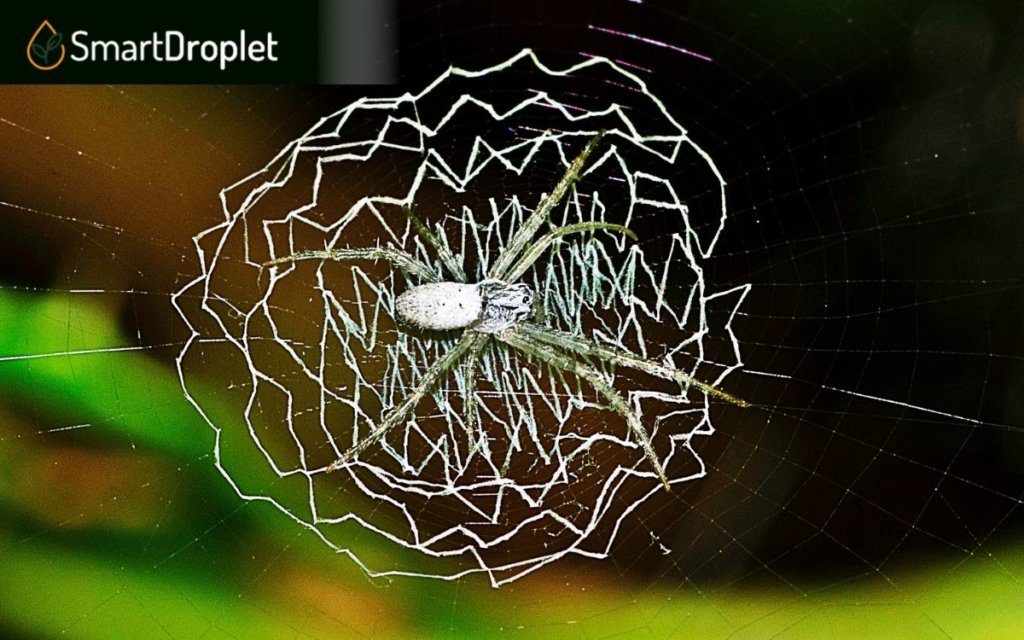
Should You Kill Lawn Spiders and Insects?
Well, YES and NO.
Of course, no one likes spiders.
But spiders are important to your lawn as they prey on mosquitoes and other pests that may damage your lawn or cause discomfort in the yard.
While they may be uncomfortable to deal with, spiders are generally harmless to the grass.
If you insist on killing them with insecticides, be mindful that some insecticides could cause damage to your lawn, ruining the ecosystem inside.
Try finding ways to repel spiders naturally without damaging the grass or lawn.
It is up to you to decide if you want to kill them or not.
How to Protect Yourself From Grass Spiders
There is a tiny chance that you will get bitten, but if you spend A LOT of time outdoors, it will not hurt to be prepared and protected!
First, you can’t go wrong with protective clothing like a long-sleeved t-shirt and some long pants and socks.
It would also be a good idea to carry spider repellant just in case. Even spraying spider repellant on your skin or clothes is a good way to prevent spiders from biting or attacking.
You can also make your repellant using water and essential oils!
Conclusion
Grass spiders are not much of a serious problem, but they can be quite pesky and annoying when they mess with your precious lawn!
After all, no one likes creepy, crawly critters hanging around in the backyard.
The best solution to getting rid of grass spiders is always proper lawn maintenance and care!
We hope this guide helped you learn more about how to get rid of grass spiders and how to prevent them!
Frequently Asked Questions
Here are some questions you might be asking yourself. Hopefully, these will shed some more light on how to handle spiders.
Are Grass Spiders Dangerous to Pets?
Grass spiders are not harmful to pets.
A grass spider will struggle to bite the skin of a cat or dog because they have similar skin types to humans.
Still, it would be best to keep your pets in a safe environment where spiders won’t disturb them or cause them discomfort.
How Do I Treat a Spider Bite?
Most spider bites are harmless and require little medical attention.
Here are the essential steps to taking care of a bite. [R]
➝ Gently clean the bite area with water and soap regularly to prevent infections.
➝ Use an ice pack or a cold washcloth onto the bite area.
➝ Take allergy medicine or pain relievers to ease itching, swelling, or pain.
If you think a dangerous spider has bitten you or if symptoms worsen, seek medical attention immediately.


